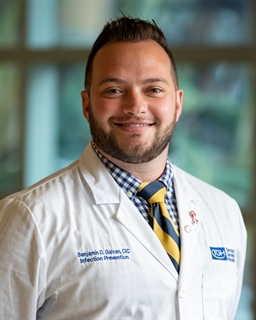1. Why did you choose a career in infection prevention and control?
Infection prevention was, unfortunately, an unknown career path to me until I joined the workforce starting as a medical technologist in the clinical microbiology lab. Once I discovered the profession and learned more about it, I was immediately captivated. Coming from the world of clinical microbiology, investigating clinical cultures and identifying what was causing infection in patients was the majority of my work; however, I really wanted to know what happened after the report went out. Having the opportunity to speak and collaborate with the infection prevention department at my hospital gave me the chance to ask questions and begin to understand what a tremendous impact infection prevention has on the entire healthcare continuum of care, and that was the level of difference I wanted to make as I advanced in my professional career.
2. What advice would you give someone who is interested in an infection prevention and control career?
To those interested in joining the rewarding field of infection prevention, I urge professionals of all clinical backgrounds, including allied health professions like medical technologists, to start searching for an IP mentor that is willing to set you on the right path. Reach out to your IP department within your hospital to see if they can provide guidance. You can also locate your local APIC chapter and find out if anyone in the area is able and willing to provide insight as well. There are a lot of resources at your fingertips, but the hardest part is knowing where to start and not to give up!
3. What does being a CIC® mean to you?
Certification is not only proof of my knowledge and capability as an infection preventionist (IP), but also validation that coming from medical technology does not hinder one’s ability to succeed as an IP. Professional diversity in new IPs joining the field can only help push Infection Prevention to the next level, and I very strongly encourage my fellow medical technologists who express interest in the field to not give up despite any setbacks they may encounter along the way.
4. What was the best studying method for you when preparing for the initial certification examination?
I found that a mix of learning modalities is the best way to prepare for your initial certification exam, including online resources through APIC and CBIC, YouTube videos and webinars, direct experience with professionals from pertinent departments like sterile processing, and studying via the APIC text. There is a lot of material on the test, and making sure you are not only studying to pass the exam but also retaining the information is what will help you succeed as an IP.
5. What advice would you give someone pursuing certification?
When I am asked about certification, my first response is not to rush into it too quickly. Infection prevention covers a very wide scope of subjects and activities, and trying to learn it all for a test without having the hands-on experience is not what infection prevention is about. Take your time and learn from your colleagues, shadow other professionals, collaborate on workgroups, and try to take in as much as you can in your first two years or so. You will find that studying the material is a lot easier when you have the hands-on knowledge to supplement it. Additionally, I always say to not be afraid of the test. The purpose of the test is to prove your proficiency as an IP, not just another bullet point on your resume. Take your time and really make sure you feel prepared to take it, and if you don’t pass just keep trying!
6. How do you stay up-to-date on infection prevention and control practices?
Staying up-to-date on all things infection prevention is not easy (and may be impossible), but there are enumerable resources out there for IPs to leverage. I particularly enjoy webinars as a way of staying abreast of important topics as these are often engaging and presented by subject matter experts. I also enjoy reading AJIC to know what the current research is showing on various IP related subjects. It is also important to stay connected with your colleagues in your infection prevention network. Joining APIC at the national and local levels will help you build bridges with other IPs and provide you with resources for questions and guidance, particularly for those of us in smaller facilities.
7. Are you part of an APIC or IPAC Canada chapter? If so, would you recommend it to others?
Yes! I am currently part of the Bay Area Chapter in Tampa, Florida (BAPIC). Being part of your local chapter gives you the opportunity to meet other local infection preventionists (IP), volunteer on committees, obtain continuing education credits/Infection prevention units (for recertification), ask questions, and feel like you are part of a community larger than you and your hospital. I’ve very much enjoyed participating in my local chapter and hope to continue to do so for many years to come.
8. How has the CIC® helped you grow professionally and in your career?
Obtaining my CIC® has given me the self-confidence to give advice, guidance, and direction to my fellow healthcare colleagues without constantly second guessing myself or feeling some level of “imposter syndrome.” Moving from behind the scenes in the micro lab to one of the more visible roles in the hospital was a challenge for me, particularly given I did not have a lot of patient-facing experience. Taking on the role of infection preventionist has given me the opportunity to challenge myself, get out of my comfort zone, and truly engage with my coworkers and colleagues throughout the hospital. I’ve had the opportunity to learn so much about healthcare in general, and am truly grateful for the opportunity I was given when I first entered the field.
